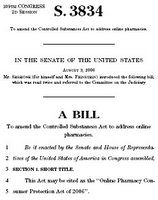
You can't read today's (or any day's) op-ed piece by Paul Krugman (or any other columnist in the
N.Y. Times) unless you are a
TimesSelect subscriber, so this link to his column,
"Health Policy Malpractice") won't work for many of you. More's the pity. He compares the VA health care system (which by most measures appears to be working well -- excellent outcomes, low costs per patient) with Medicare Advantage (the managed-care plan that is a sufficient disaster that it can keep private insurers involved only by providing billions in subsidies).
What explains the VA's success? Here's Krugman's version:
The key to the V.A.’s success is its long-term relationship with its clients: veterans, once in the V.A. system, normally stay in it for life.
This means that the V.A. can easily keep track of a patient’s medical history, allowing it to make much better use of information technology than other health care providers. Unlike all but a few doctors in the private sector, V.A. doctors have instant access to patients’ medical records via a systemwide network, which reduces both costs and medical errors.
The long-term relationship with patients also lets the V.A. save money by investing heavily in preventive medicine, an area in which the private sector — which makes money by treating the sick, not by keeping people healthy — has shown little interest.
The result is a system that achieves higher customer satisfaction than the private sector, higher quality of care by a number of measures and lower mortality rates — at much lower cost per patient.
You might think that the government would be happy to see more veterans receive more of their care within the VA system, but you'd be wrong:
Not surprisingly, hundreds of thousands of veterans have switched from private physicians to the V.A. The commander of the American Legion has proposed letting elderly vets spend their Medicare benefits at V.A. facilities, which would lead to better medical care and large government savings.
Instead, the Bush administration has restricted access to the V.A. system, limiting it to poor vets or those with service-related injuries. And as for allowing elderly vets to get better, cheaper health care: “Conservatives,” writes Time, “fear such an arrangement would be a Trojan horse, setting up an even larger national health-care program and taking more business from the private sector.”
The irony isn't lost on Krugman: "Think about that: they won’t let vets on Medicare buy into the V.A. system, not because they believe this policy initiative would fail, but because they’re afraid it would succeed."
Meanwhile, the subsidies to lure private insurers into the Medicare managed care market push the costs to the government 11 percent higher than traditional Medicare and mortality rates are 40 percent higher than those of elderly veterans in the VA system. Krugman's conclusion:
On one side, then, the administration and its allies in Congress oppose expanding the best health care system in America, even though that expansion would save taxpayer dollars, because they’re afraid that allowing a successful government program to expand would undermine their antigovernment crusade and displease powerful business lobbies.
On the other side, ideology and fealty to interest groups make them willing to waste billions subsidizing private H.M.O.’s.
I don't really have a quarrel with Krugman's argument. Okay, maybe a nit to pick here or there (for example, the better comparison of costs-per-patient would have been between Medicare managed care, on the one hand, and the VA on the other -- Krugman implies that the VA's costs are lower than Medicare managed care, but he never actually says it. And research schlub that I am, I don't know where to go to get that missing piece of his argument.)
Also, I know it's dangerous to try to make policy on the basis of anecdote, but every medical student I know who rotates through the VA hospital here in Dallas comes back with horror stories of poor care (with respect to the technical component, the interpersonal component, and the amenities). It's just one hospital in a vast system, and the examples of bad care are likely to make more of an impression than the virtually silent and invisible examples of care that is provided well, but everyone I know rolls their eyes at the mention of the VA hospital. And yet, the VA stats speak for themselves, don't they?
 Here are last month's postings to the ever-useful SSRN:
Here are last month's postings to the ever-useful SSRN:
















